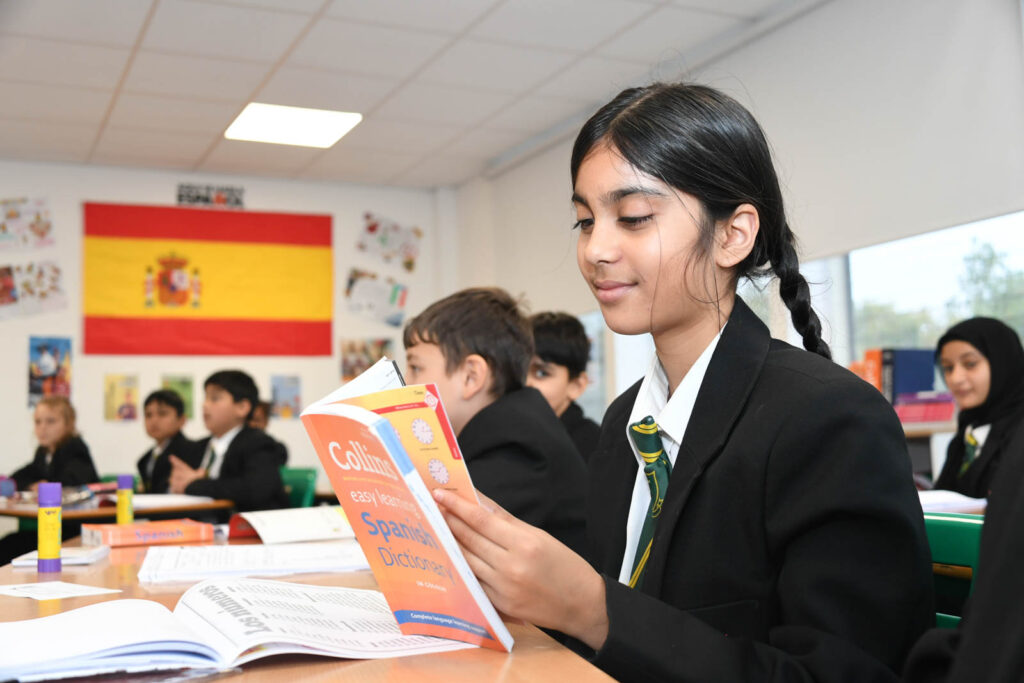Modern Foreign Languages
“If you talk to a man in a language he understands, that goes to his head. If you talk to him in his language, that goes to his heart.” Nelson Mandela
“One language sets you in a corridor for life. Two languages open every door along the way.” Frank Smith
In the Modern Foreign Language (MFL) department we teach our pupils to be compassionate and loving. The MFL Curriculum at Holy Trinity enables pupils, regardless of their starting ability, to discover more about a foreign language, developing their desire and ability to communicate with and understand speakers of the assessed language in a variety of contexts and for a variety of purposes. The study of a modern foreign language will broaden horizons, develop cultural knowledge and understanding and foster transferable skills such as confidence, communication, problem solving and creativity.
The MFL department contributes to the whole school curriculum intent by:
Fostering pupils’ curiosity and deepening their understanding of the world and of Spanish culture. Ensuring a “languages for all” approach to teaching all abilities. Enabling pupils to express their ideas and thoughts in another language. Providing opportunities for them to communicate for practical purposes. Equipping pupils with skills to understand and respond to spoken and written language from a variety of authentic sources. Increasing confidence, fluency, and spontaneity, finding ways of communicating what they want to say, including through discussion and asking questions, and continually improving the accuracy of their pronunciation and intonation. Ensuring pupils can write at varying length, for different purposes and audiences, using the variety of grammatical structures that they have learnt. Allowing students to discover and develop an appreciation of a range of writing in the language studied. Providing the foundation for learning further languages, equipping pupils to study and work in other countries. Promoting literacy and numeracy across all teaching, where applicable. The department will link to careers, contribute to whole school initiatives, and promote staff well-being. Rooted in Catholic Social Teaching, the department also nurtures values of solidarity and respect for human dignity by encouraging students to engage with diverse cultures and communities, fostering empathy and a sense of global responsibility in line with our school’s mission.
The MFL Department aims to:
· Promote intercultural understanding.
· Enable students to have a more profound understanding of their own language and culture.
· Develop the skills and confidence to understand and speak in the target language with a real purpose.
· Help prepare students to become global citizens.
· Build cultural capital.
· Provide a competitive edge for future careers.
· Relate language learning to current affairs.
· Provide first-hand experience of foreign language and culture via trips and use of authentic classroom materials.
· Cultivate a spirit of solidarity and respect for human dignity. Through language learning, students are encouraged to recognise the universal call to love one another, as taught by Christ. This holistic approach prepares them not only for academic success but also for compassionate engagement in an increasingly interconnected world.
Catholic Social Teaching (CST) and MFL
Human Dignity
Every person has an intrinsic value because they are made in the image of God. In learning French or Spanish, students discover the importance of respecting different cultures and people, recognising that every individual deserves respect regardless of their nationality or language. This principle encourages us to see beyond stereotypes and appreciate the unique story behind every person we meet through language.
“Tu as du prix à mes yeux, tu m’es précieux.” (Ésaïe 43:4)
“You are precious in my eyes, and honoured, and I love you.”(Isaiah 43:4)
Common Good
The common good refers to the social conditions that allow individuals and communities to flourish. In an MFL classroom, learning languages promotes mutual understanding and cooperation between cultures. It encourages students to think about how their knowledge can contribute to building more peaceful and inclusive communities.
“Amarás a tu prójimo como a ti mismo.” (Mateo 22:39)
“You shall love your neighbour as yourself.” (Matthew 22:39)
Stewardship
Stewardship means caring responsibly for the world God has given us, including the environment and its resources. Language learning offers opportunities to explore how different cultures relate to nature and the planet. It encourages students to reflect on how their actions affect others and future generations, fostering a global sense of responsibility.
L’Éternel, le Dieu de tes pères, te donnera la terre.” (Deutéronome 1:8)
“The Lord your God will give you this land.” (Deuteronomy 1:8)
Participation
When students learn a new language, they gain tools to take part in cultural, social, and even political conversations beyond their own country. This broadens their horizons and helps them become active global citizens who contribute positively to their communities.
Dejen que los niños vengan a mí, y no se lo impidan, porque de los que son como ellos es el reino de Dios.” (Marcos 10:14)
“Let the little children come to me, and do not hinder them, for the kingdom of God belongs to such as these.” (Mark 10:14)
Solidarity
Standing together with others, especially those suffering or in need. Language learning builds bridges across cultures, fostering understanding and shared responsibility. It encourages students to see themselves as part of a global community committed to justice and peace.
Amaos los unos a los otros con amor fraternal; en cuanto a honra, prefiriéndoos los unos a los otros.” (Romanos 12:10)
“Be devoted to one another in love. Honour one another above yourselves.” (Romans 12:10)
Promoting Peace
Peace is more than the absence of conflict; it involves justice, respect, and reconciliation. Learning languages helps students understand diverse perspectives and resolve misunderstandings peacefully. It encourages dialogue and cooperation among people from different backgrounds.
“Bienaventurados los pacificadores.” (Mateo 5:9)
“Blessed are the peacemakers.” (Matthew 5:9)
Please click below for details of our MFL curriculum;
Key Stage 3
KS3 Current French & Spanish CST
Key Stage 4
KS4 French CST Curriculum
KS4 Spanish CST Curriculum



